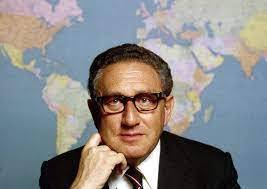Henry Kissinger, born on May 27, 1923, is a figure whose impact on global diplomacy has left an indelible mark.
Early Life and Academic Brilliance
Kissinger's journey began in Fürth, Germany, where he fled the Nazi regime with his family in 1938, eventually settling in the United States. His academic prowess shone at Harvard University, where he earned a Bachelor's degree summa cum laude in 1950, later obtaining a Master's and Doctorate in Government.
Rise to Prominence
The 1960s saw Kissinger emerge as a leading academic and advisor, catching the attention of then-President Richard Nixon. In 1969, he was appointed National Security Advisor, and later Secretary of State. His realpolitik approach shaped America's foreign policy during the Cold War.
Diplomatic Triumphs and Controversies
Kissinger's orchestration of the historic opening of diplomatic relations with China in 1971 stands as a testament to his strategic brilliance. The Paris Peace Accords, which marked the end of U.S. involvement in the Vietnam War, further showcased his diplomatic finesse. However, his methods, including the secret bombing of Cambodia, stirred controversy and criticism.
Nobel Peace Prize and Legacy
In 1973, Henry Kissinger, along with North Vietnam's Le Duc Tho, was awarded the Nobel Peace Prize for negotiating the ceasefire in Vietnam. The irony of a peace prize awarded during a conflict reflects the complex nature of Kissinger's legacy. His influence extended beyond the political arena, with his acclaimed book "Diplomacy" offering insights into statecraft.
Criticisms and Historical Reflection
Kissinger's legacy is not without its detractors. Critics argue that his policies in Chile, East Timor, and elsewhere were morally questionable. The shadow of the Watergate scandal and questions about the role he played continue to linger.
The complex legacy of Henry Kissinger serves as a reminder of the intricate nature of politics and diplomacy. The mark he left on history, for better or worse, underscores the importance of understanding the nuanced dynamics that shape our world.




No comments yet
Be the first to share your thoughts!